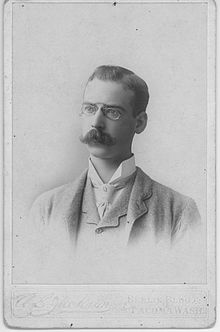Richard H. Geoghegan
| Richard H. Geoghegan | |
|---|---|

Geoghegan, c. 1895
|
|
| Born |
8 January 1866 Birkenhead, Cheshire, England |
| Died | 27 October 1943 (aged 77) Fairbanks, Alaska, USA |
| Residence |
Washington State, USA Alaska, USA |
| Nationality | Irish |
| Occupation | Court stenographer |
| Known for | Accomplished linguist; first Esperantist in the English-speaking world |
Richard Henry Geoghegan (/ˈɡeɪɡən/; 8 January 1866 – 27 October 1943) was an Englishman of Irish descent. As a young man he lived for a while in Washington State, United States and then moved to Alaska (then a U.S. territory). Geoghegan was a remarkable philologist and apparently the first English-speaking Esperantist.
When he was 3 years old, Richard Geoghegan suffered a fall on the stairs at home, as a result of which he was crippled for life, walking with difficulty and often with the help of a cane. As if in compensation for his physical handicap, from an early age he displayed extraordinary intellectual abilities, especially in the learning of languages. Around the age of 17, he became interested in Oriental writing systems and entered the University of Oxford, in January 1884, to study Chinese. There he showed himself to be an outstanding student, twice receiving scholarship awards, but he never obtained a degree. At Oxford, Chinese remained a nondiploma field of study until 1936.
In the autumn of 1887, when the language Esperanto had just appeared, Geoghegan read an article about it and immediately wrote to the language's creator, L.L. Zamenhof (in Latin). Zamenhof sent Geoghegan a German edition of his Unua Libro (First Book). Having learned the language from this book in short order, a while later Geoghegan received from Zamenhof the first copies of the same book in an English translation by the Warsaw Jew J. St. (pseudonym of Julian Steinhaus). Geoghegan warned Zamenhof that this translation was a mess, and it would only make a laughingstock of Esperanto in the English-speaking world. Subsequently, Zamenhof asked Geoghegan to produce a more suitable translation himself, which he did. The translation by Steinhaus was withdrawn, and in 1889 Geoghegan's was published. In the Unua Adresaro, an early directory of supporters of Esperanto, Geoghegan appears as number 264.
Richard Geoghegan left Oxford at the end of 1887 and was an instructor of classical languages in London until 1891, when he—along with his widowed mother and siblings—emigrated to the village of Eastsound in the northwestern United States. Not finding an opportunity to support himself in the fishing/farming economy there, in 1893 he went to Tacoma, in the state of Washington, where he worked as a stenographer for an Anglican bishop, and later in the same capacity for the English and Japanese consulates.
...
Wikipedia
